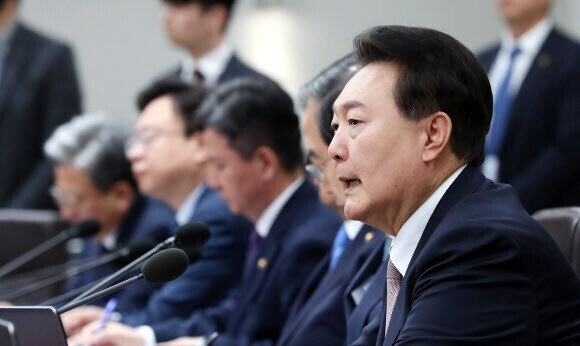hankyoreh
Links to other country sites 다른 나라 사이트 링크
Yoon orders active review of foreign domestic helper policy to address Korea’s low birth rate

President Yoon Suk-yeol reportedly ordered relevant ministries to actively consider the introduction of a foreign domestic helper system like those currently in place in Hong Kong and Singapore at a Cabinet meeting on Tuesday.
According to Hankyoreh’s coverage, in an off-the-record remark during the meeting, Yoon ordered relevant ministries, including the Ministry of Justice, to actively consider introducing foreign domestic workers as a way to solve Korea’s low birth rate problem, according to multiple attendees.
One attendee stated that the president said it was “necessary to introduce foreign domestic helper systems, which have been adopted by Singapore and other countries,” and that he “wanted the relevant ministries to strongly [push] for it.”
“I understood him to mean that since we cannot force women to have more children, we should proceed with the passage of relevant legislation to introduce a foreign domestic helper system [to ease the burden of childcare],” said another attendee.
Currently, only Chinese nationals or compatriots are permitted to work as domestic helpers. The intention is to expand the program to foreign workers from Southeast Asia, much like in the case of Singapore and Hong Kong.
However, labor and women’s groups have pointed out that the plan to introduce foreign domestic workers is not a solution to the declining birthrate. The Korean Confederation of Trade Unions (KCTU) opposed the Seoul metropolitan government and the Ministry of Employment and Labor’s plan to expand the non-professional employment (E9) visas to migrant domestic workers, saying, “The plan may not be able to guarantee the labor rights of migrant women, and may harm the establishment of quality care work policies.”
Given the precarious social statuses and rights of migrant domestic workers, this plan may subject these workers to persistent sexual discrimination and prejudice. Experts also agree that it is more important to shorten working hours for Koreans and create gender-equitable social conditions rather than rely on cheap labor.
In March, lawmaker Cho Jung-hun proposed a bill to amend the Act on Employment Improvement of Domestic Workers that would exclude foreign domestic workers from the minimum wage requirement. This sparked controversy with claims that this was blatant discrimination against migrant workers.
In response, an official from the presidential office said, “We are not proposing to introduce foreign domestic workers who will be excluded from the minimum law requirement, as proposed by Rep. Cho. The government is planning a pilot project to expand the number of foreign workers, who mainly are employed in the manufacturing industry, to the domestic field.”
By Bae Ji-hyun, staff reporter; Kim Hae-jeong, staff reporter
Please direct questions or comments to [english@hani.co.kr]

Editorial・opinion
![[Column] Life on our Trisolaris [Column] Life on our Trisolaris](https://flexible.img.hani.co.kr/flexible/normal/500/300/imgdb/original/2024/0505/4817148682278544.jpg) [Column] Life on our Trisolaris
[Column] Life on our Trisolaris![[Editorial] Penalties for airing allegations against Korea’s first lady endanger free press [Editorial] Penalties for airing allegations against Korea’s first lady endanger free press](https://flexible.img.hani.co.kr/flexible/normal/500/300/imgdb/original/2024/0502/1817146398095106.jpg) [Editorial] Penalties for airing allegations against Korea’s first lady endanger free press
[Editorial] Penalties for airing allegations against Korea’s first lady endanger free press- [Editorial] Yoon must halt procurement of SM-3 interceptor missiles
- [Guest essay] Maybe Korea’s rapid population decline is an opportunity, not a crisis
- [Column] Can Yoon steer diplomacy with Russia, China back on track?
- [Column] Season 2 of special prosecutor probe may be coming to Korea soon
- [Column] Park Geun-hye déjà vu in Yoon Suk-yeol
- [Editorial] New weight of N. Korea’s nuclear threats makes dialogue all the more urgent
- [Guest essay] The real reason Korea’s new right wants to dub Rhee a founding father
- [Column] ‘Choson’: Is it time we start referring to N. Korea in its own terms?
Most viewed articles
- 1New sex-ed guidelines forbid teaching about homosexuality
- 260% of young Koreans see no need to have kids after marriage
- 3OECD upgrades Korea’s growth forecast from 2.2% to 2.6%
- 4[Column] Life on our Trisolaris
- 5[Guest essay] Maybe Korea’s rapid population decline is an opportunity, not a crisis
- 6Presidential office warns of veto in response to opposition passing special counsel probe act
- 7S. Korea discusses participation in defense development with AUKUS alliance
- 8Two lung cancer deaths at Samsung Electronics deemed occupational in nature
- 9Trump asks why US would defend Korea, hints at hiking Seoul’s defense cost burden
- 10Inside the law for a special counsel probe over a Korean Marine’s death